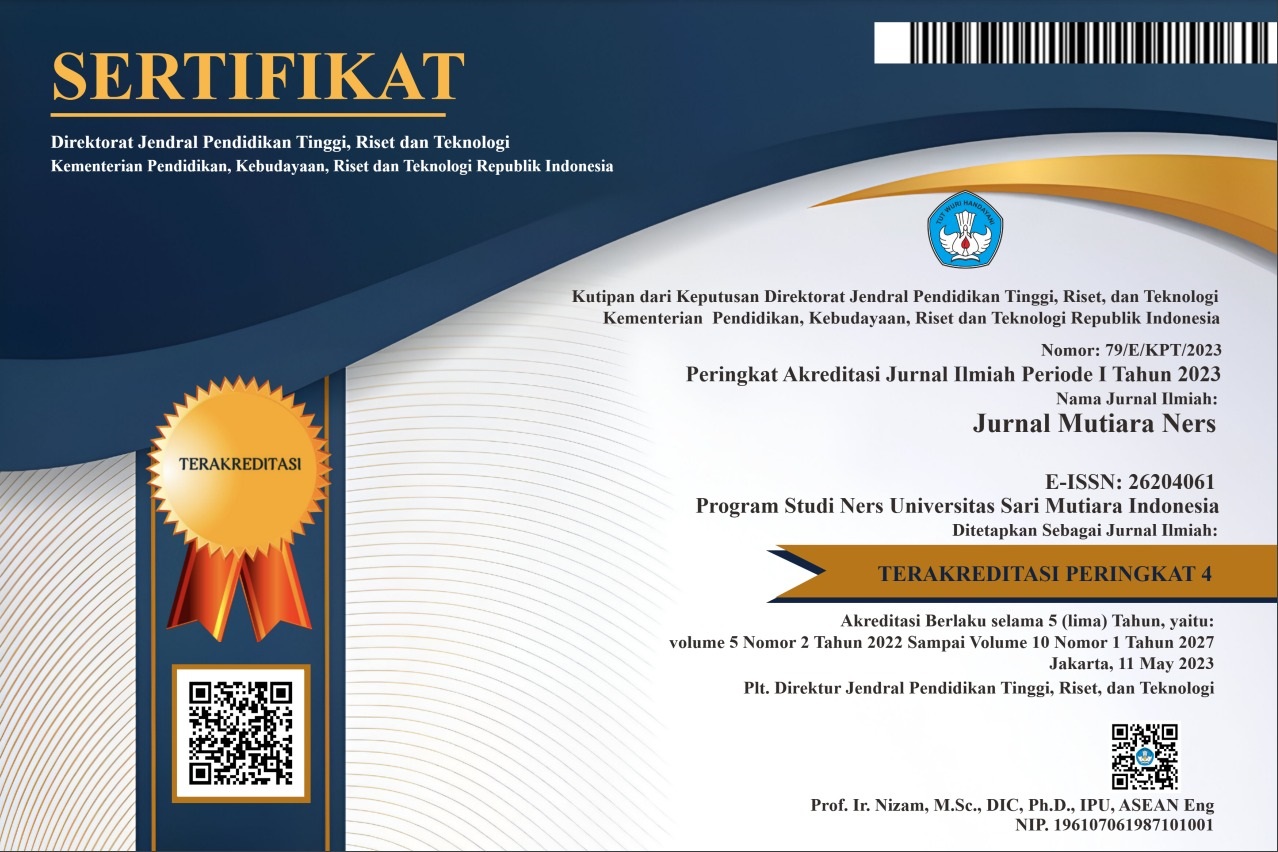STADIUM HIV/AIDS DAN TINGKAT STRES: KORELASI KEDUANYA
HIV/AIDS STADIUM AND STRESS LEVEL: BOTH CORRELATION
Keywords:
HIV/AIDS, Stadium, Stress LevelAbstract
Background: Infectious diseases that are still of concern to many circles, namely HIV / AIDS. This is confirmed by the reason that there is still an increase in the number of cases. In addition, this disease makes sufferers or people who are often known as people living with HIV / AIDS (PLWHA) experience both physical and psychological problems. The physical problems experienced by PLWHA, of course, depend on the stage of the patient's disease. PLWHA who experience physical problems may experience stress due to their illness. The purpose of this study was to determine the relationship between HIV stage and stress levels. Method: This type of research is a quantitative observational study with a correlation analytic design with consecutive sampling technique. Data collection was carried out by using a questionnaire with the number of respondents as many as 38 people. The data obtained were processed statistically using the Spearmen Rho statistical test. Results: based on the data, it was found that from 38 research respondents, most of them were 20-60 years old (76.3%). The majority of people with HIV / AIDS were male, namely 23 people (60.5%) with most of the occupations of HIV / AIDS sufferers being private (63.2%). Respondents' HIV was at stage II (50%) and III (50%). The level of stress experienced by HIV / AIDS sufferers is quite good, namely: at level I (31.57) and II (68.43). r = -174, p-value = 0.283. Conclusion: there is no correlation between HIV stage and stress level.
Downloads
References
Asis, N. P., Tilaqza, A., Airlangga, H., Asis, N. P., Tilaqza, A., & Airlangga, H. (2018). Pengaruh Stadium HIV terhadap Infeksi Oportunistik , Penggunaan Antiretroviral dan Antibiotik pada Pasien HIV di Rumah Sakit X Kota Malang The Effect of HIV Stadium on Opportunistic Infection , Antiretroviral and Antibiotic Use in HIV Patients at X Hospit. (0341), 8–18.
Cahyono, W., & Sony, P. I. (2017). Gambaran Pengaruh Stigma Negatif Pada Penderita HIV Positif Di Nganjuk. Jurnal Ilmu Keperawatan Dan Kebidanan., 8(2), 72–78.
Ezeh, O. H., & Ezeh, C. C. (2019). Correlates and Predictors of Psychological Morbidity in HIV-Infected Persons: A Cross Sectional Study. Open Journal of Medical Psychology, 08(04), 57–65. https://doi.org/10.4236/ojmp.2019.84006
Ilham, M., Triliana, R., & Tilaqza, A. (2020). the Role of Age , Gender , Job , and Health Financing To Hospitalization and Secondary Infection in Hiv Patients in Malang Hospital. Jurnal Bio Komplementer Medicine, 7(1), 1–9.
Ledda, C., Cicciù, F., Puglisi, B., Ramaci, T., Nunnari, G., & Rapisarda, V. (2017). Attitude of health care workers (HCWs) toward patients affected by HIV/AIDS and drug users: A cross-sectional study. International Journal of Environmental Research and Public Health, 14(3). https://doi.org/10.3390/ijerph14030284
Manalu, R. M., Harahap, S. Y., & Sinurat, I. (2019). Faktor-Faktor Yang Mempengaruhi Kejadian Infeksi Hiv Pada Usia Produktif Di Komite Aids Hkbp Balige. Indonesian Trust Health Journal, 2(2), 190–198. https://doi.org/10.37104/ithj.v2i2.35
Mukherjee, A., Lahiry, S., Mukherjee, A., Choudhury, S., & Sinha, R. (2017). Study on Defense Mechanisms to Cope With Stress Due to Stigma Among People Living With HIV/AIDS Reported in Eastern India: A Single Center Experience. Integrative Medicine Insights, 8. https://doi.org/10.1177/1179916117742919
Noffritasari, B. (2020). Human Immunodeficiency Virus (Hiv) Prevention Program Among Men Who Have Sex With Men (Msm) in Semarang City. Jurnal Administrasi Kesehatan Indonesia, 8(1), 91. https://doi.org/10.20473/jaki.v8i1.2020.91-106
Nursalam, Ninuk, Bakar, A., Purwaningsih, & Candra. (2014). Respons Bio-Psiko-Sosio-Spiritual Pada Keluarga Tenaga Kerja Indonesia Yang Terinfeksi Hiv. Jurnal Ners, 9(2), 209–216.
Riono, P., & Challacombe, S. J. (2020). HIV in Indonesia and in neighbouring countries and its social impact. Oral Diseases, 26(S1), 28–33. https://doi.org/10.1111/odi.13560
Surya Antara, I. N. B. (2019). Profil Gangguan Fungsi Kognitif Pasien HIV/AIDS di Klinik VCT RSUP Sanglah. Medicina, 50(1), 104–108. https://doi.org/10.15562/medicina.v50i1.289
Utomo, U. (2008). Hubungan Antara Model-Model Coping Stres (Universitas Islam Negeri Maulana Malik Ibrahim). Retrieved from http://etheses.uin-malang.ac.id/4372/1/04410005.pdf
Wahyuni, A. (2018). Faktor-Faktor Yang Mempengaruhi Perubahan Perilaku Pasien Hiv/Aids. Human Care Journal, 1(2), 1–10. https://doi.org/10.32883/hcj.v1i2.5
Wiyati, T. G. K. (2019). Hubungan Antara Lama Terdiagnosa Dengan Kualitas Hidup Orang Dengan Hiv / Aids Di Yayasan Victory Plus Tahun 2019 Hubungan Antara Lama Terdiagnosa Dengan Kualitas Hidup Orang Dengan Hiv / Aids Di Yayasan Victory Plus Tahun 2019. Skripsi.


.png)





